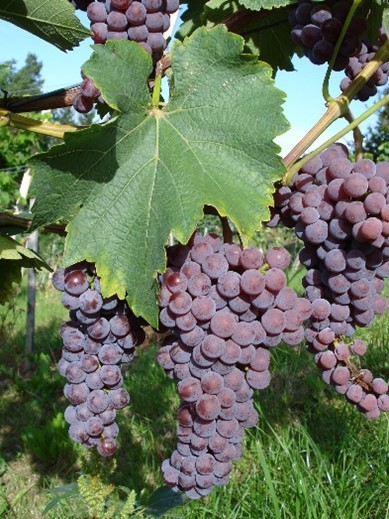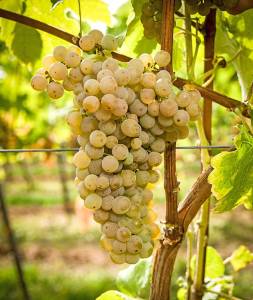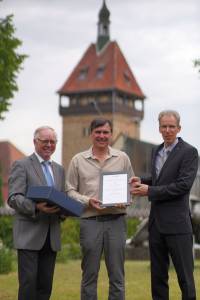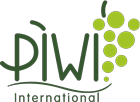2 PSM treatments are sufficient even in case of high disease pressure in Muscaris and Souvignier gris
«The Grangeneuve organic winery in the Dordogne is managed by the department's Chamber of Agriculture as part of the Dephy network.
In 2018, winemaker and owner Anthony Castaing planted the first resistant grape varieties: Muscaris and Souvignier gris.
In the last two vintages, 2022 and 2023, two copper and sulphur-based treatments were carried out on these vineyards. His overall indicator for the frequency of plant protection treatments is 1.56. "This is a great advance in plant protection and a reduction in workload, even in years with strong downy mildew pressure like 2023," he notes.
On the other hand, "it is no longer possible to go on holiday in the last two weeks of August". In 2022, for example, the Souvignier Gris was harvested on August 24, well ahead of the Sauvignon gris, the reference grape variety in the monitoring carried out by the CA24.
This "marked advancement of the phenological stages begins as soon as bud break occurs," says consultant Camille Delamotte during a webinar on the subject. In 2022 and 2023, Muscaris and Souvignier gris were in the "green point" or "leaf break" stage at the end of March. In 2022, the vines were affected by a spring frost on April 1. "This risk must be taken into account. These varieties are recommended for terroirs with little or no frost."
>>> Read also: First feedback on the resistant variety Souvignier gris»
Source: www.tema-agriculture-terroirs.fr
First feedback on the resistant variety Souvignier gris
First feedback on the resistant variety Souvignier gris
Its berries are pink, which is not very common among the most widely grown grape varieties in France. However, its greatest peculiarity is that it is resistant to powdery mildew and downy mildew. It has inherited this resistance from one of its relatives, the Bronner (the other is Cabernet Sauvignon). It is called Souvignier gris, one of the resistant varieties currently authorized in France.
The IFV can confirm that the Souvignier gris has at least one resistance gene against powdery mildew: Ren 3.
(more…)
Souvignier gris: fruity or Burgundian?
VARIETY CHARACTERISTICS AND ADJUSTMENTS IN THE CELLAR
Author Wolfgang Renner

According to multiple applications in 2023, there are 66 hectares of the Souvignier gris grape variety in Austria. This proves to be a versatile representative of the group
of fungus-resistant grape varieties (PIWI). Current grafting figures suggest a further increase in area. Several years of experience in
Cultivation and expansion from Styria shows the characteristics of this variety.
The Piwi grape variety Souvignier gris (pronounced Suvinje grie) was bred in 1983 by Norbert Becker (1937 – 2012) at the State Viticulture Institute in Freiburg im Breisgau (D). Originally, the parentage Cabernet Sauvignon x Bronner was assumed. However, a genome analysis disproved this assumption. Souvignier gris is actually a cross between Seyval Blanc x Zähringer.
Conclusion:
In any case, Souvignier gris is an interesting newcomer. The German breed from the Freiburg im Breisgau Wine Institute is enjoying increasing popularity in most Austrian wine-growing regions. Depending on the ripeness of the berries and the way the grapes and must are processed, this grape variety can produce many different variants - from simple quality wine to excellent quality sparkling wine.
Previous experiences also show that Souvignier gris is able to represent the terroir of an area or a location well.
Newly approved PIWI varieties in the wine regions of Europe
In the Official Journal of the EU C 222 of June 26, 2023, a new (PIWI) variety was approved for the PDO "Champagne". The Voltis variety has been added to the existing seven main varieties. The maximum permitted grape yield is 15.5 t/ha.
A notice on the creation of the new German PGI "Großräschener See" was published in the Official Journal of the EU C 222 on 26/06/2023. The cultivated varieties are the PIWI varieties Solaris, Cabernet blanc, Johanniter and Pinotin. The PGI is located in Brandenburg on the Großräschener See, near the border with Saxony. The maximum yield is set at 90 hl/ha.
In the Official Journal of the EU C 230 of June 30, 2023, the approval of new varieties (PIWI) for the PGI "Pays d'Hérault" (near Montpellier) was granted. A total of 17 new PIWI varieties were added and 18 old varieties that are no longer used were removed. The newly approved PIWI varieties are Artaban N, Bronner B, Cabernet blanc B, Cabernet Cortis N, Floreal B, Johanniter B, Monarch N, Muscaris B, Pinotin N, Prior N, Saphira B, Sauvignac B, Solaris B, Soreli B, Souvigner gris B, Vidoc N and Voltis B. (N=Noir, B= Blanc)
Jiří Sedlo, July 18, 2023
PIWI grape variety Calardis Musqué receives plant variety protection
 The white grape variety cultivated at the Julius Kühn Institute with pleasant exotic fruit aromas is resistant to several pathogens.
The white grape variety cultivated at the Julius Kühn Institute with pleasant exotic fruit aromas is resistant to several pathogens.
(Siebeldingen) Vine breeding takes time. This also and especially applies to the new grape variety Calardis Musqué. It was crossed in 1964 at the Geilweilerhof in Siebeldingen from Bacchus and Seyval Blanc. 59 years later, the development of vine breeding at the Julius Kühn Institute (JKI), the Federal Research Institute for Cultivated Plants, has now been awarded plant variety protection.
Calardis Musqué is one of the so-called PIWI (fungus-resistant grape varieties). In addition to moderate resistance to powdery mildew, downy mildew and botrytis, it also has a high resistance to black rot. These properties mean that significantly fewer pesticides have to be applied during cultivation - an important step towards more sustainable viticulture and also essential for organic cultivation.
copyright Julius Kühn Institute
Spotlight on PIWI varieties by Edy Geiger
Since 2021, when many winegrowers were only able to keep fungal diseases under control with great difficulty, interest in PIWI vines has risen sharply. Especially because of the prospect of financial aid for new plants. PIWI pioneer Edy Geiger presents what he sees as the most promising varieties.
Source: Swiss magazine Obst + Wein April 2023
PIWI Pedia by Arnold Becker
PIWI-Sorten von A bis Z, in 3 Teilen
Pilzwiderstandsfähige Rebsorten (Piwis) erfahren derzeit ein gesteigertes Interesse: Forschungen werden intensiviert, Vereinigungen zu diesem Thema gegründet und Pfropfreben mancher Sorten sind in Deutschland auf 3 Jahre hin ausverkauft. Gleichzeitig will die Zusammensetzung des Rebsortenportfolios innerhalb eines Betriebs gut über legt sein. Arno Becker vom DLR Rheinhessen-Nahe-Hunsrück möchte mit der Erstellung einer „Piwi-Pedia“ Hilfestellung geben.
Ziel dieses Beitrags ist es, vorhandenes Wissen zusammenzuführen, fortzuschreiben und einen möglichst umfassenden Überblick zu vermitteln. Schließlich werden immer wieder Erkenntnisse über Versuchsserien veröffentlicht, die zwar Teile des Themas darstellen, aber es naturgemäß nicht in der Gesamtheit abbilden können.
Zudem hat der Komplex pilzwiderstandsfähige Rebsorten eine hohe Dynamik, so dass es der Fachliteratur oft schwerfällt, Schritt zu halten.
Bei Züchterangaben werden zudem überwiegend die positiven Attribute in den Vordergrund gestellt.
Quelle: Das deutsche Weinmagazin 14.1.2023 1/2 bis 4
Status of acreage of PIWI varieties in Czech vineyards
At the end of the 2021/2022 wine year, according to the wine register, there were more than 17,900 ha of vineyards in the Czech Republic, of which almost 900 ha (896 ha) were planted with PIWI varieties, ie 5.0 %. The development of the area under cultivation of the PIWI varieties since 2012 is roughly represented by a growth line (Figure 1). In the last ten years, the area under cultivation has increased fivefold, and around 75 hectares are replanted every year.
divico: assemblage partner for Pinot noir?
It is well known that Pinot noir is becoming less popular with inexperienced wine consumers due to its relatively light colour. This shortcoming is partially remedied with so-called dyer grapes. Now the fungus-resistant variety Divico is being discussed as an assemblage partner - because of the color and the olfactory potential.
Pinot noir is still the most commonly grown red wine variety in Switzerland. Their high qualitative potential is sometimes reduced by a color intensity that is judged to be rather weak. Dyer grapes such as Dakapo and Dunkelfelder are grown in Switzerland, and their wines are used in low-percentage blends to improve color. With the Divico vine developed by Agroscope and approved in 2013, which is resistant to downy and powdery mildew and gray mold, another variety is available that is suitable for this purpose. In a trial carried out on the Agroscope experimental farms in Changins and Pully, a 10 % blend of Divico with Pinot noir was compared with blends of the Dakapo and Dunkelfelder grape varieties.
Source fruit and wine growing Switzerland
Author: Jean-Laurent Spring Agroscope, Pully
read more (English)
Viticulture needs new fungus-resistant and stress-tolerant grape varieties in order to be able to defy climate change

Vine breeders and geneticists from 23 countries exchanged ideas at the XIII. GBG symposium in the Palatinate.
(Siebeldingen) The Institute for Vine Breeding of the Julius Kühn Institute (JKI), located on the Geilweilerhof in the Palatinate, had the honor of hosting the international symposium on vine breeding and genetics this summer (2022). The "XIII. Symposium for Grapevine Breeding and Genetics" took place from 10.-15. July in the Art Nouveau festival hall in Landau. 180 scientists from 23 countries in Europe and overseas came together to present and discuss current research results. The event takes place every four years at different locations around the world. The next host country after Germany is Croatia in 2026. The series of events was launched almost half a century ago by the vine growers at the Geilweilerhof in Siebeldingen, who have been part of the Julius Kühn Institute since 2008.
"Pioneering Wines (PIWIs) - Innovation and Tradition"
This was the motto of the 13th International Symposium on Grapevine Breeding and Genetics, held from July 10-17 in the Art Nouveau Hall in Landau, Germany, where renowned breeding researchers and those involved in breeding and refining met.
The event was held under the patronage of the German Federal Ministry of Food and Agriculture (BMEL) and the International Organization of Vine and Wine, OIV for short. The dedicated team of the Julis Kühn Institute organized a varied and exciting program of lectures, discussions and excursions, which of course included the gala dinner on Thursday evening.
Peter Morio Prize for Vine Breeding goes to Prof. Dr. Jochen Bogs from the Neustadt Wine Campus

Peter Morio Prize for vine researcher from Weincampus Neustadt: from left Prof. Dr. Reinhard Töpfer (head of JKI vine breeding), award winner Prof. Dr. Jochen Bogs and Dr. Andreas Kortekamp (2nd chairman, sponsors and friends of the Institute for Vine Breeding Geilweilerhof eV © J. Fuchs/JKI
Press release from the Julius Kühn Institute (JKI) – Federal Research Institute for Cultivated Plants No. 10 from July 5th, 2022
The Friends of the JKI Institute for Vine Breeding honors the scientist for his outstanding research on disease-resistant grape varieties, among other things.
(Siebeldingen) Jochen Bogs was awarded the Peter Morio Prize 2022 for his outstanding scientific contribution to vine breeding. Prof. Bogs teaches at the wine campus in Neustadt, among other things, on the physiology and biochemistry of the vine and grapes, biotechnology, vine breeding and vine nutrition. His numerous publications speak for his excellent scientific networking in Germany and abroad. His expertise is valued worldwide. The prize is awarded by the community of sponsors and friends of the Geilweilerhof Institute for Vine Breeding. The Institute for Vine Breeding at the Geilweilerhof site in Siebeldingen belongs to the Julius Kühn Institute (JKI), the Federal Research Institute for cultivated plants. The award was presented on June 3rd at the association's annual general meeting.
In his laudatory speech, the head of the JKI vine breeding and managing director of the association, Prof. Dr. Töpfer, Prof. Bogs for his achievements. Jochen Bogs is currently researching the mechanisms with which fungus-resistant grape varieties (PIWI) defend themselves against harmful fungi. Another focus of his research is the ingredients of the berries and their influence on the quality of the grapes. He is currently working with the vine breeders and vine protectors of the JKI in the VITIFIT project: "Healthy vines in organic viticulture through research, innovation and transfer" together. Further joint research projects have been applied for.


